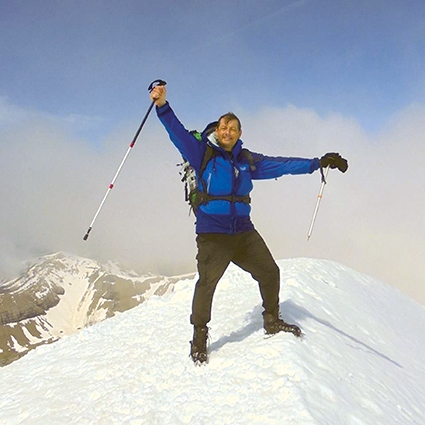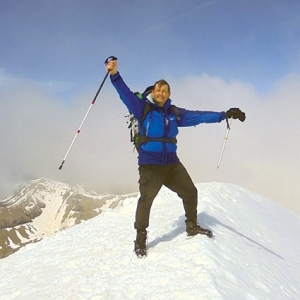The Sky’s the Limit: The Amazing Quest of Fergal Hingerty
Exclusive
Back in 2001, Irishman Fergal Hingerty was diagnosed with chronic sciatica caused by spinal deterioration from an old back injury. The prognoses were not particularly hopeful, not to say dreadful, leaving him with the chance he might spend the rest of his life in a wheelchair. Yet he not only managed to recover, but found his passion in hiking and mountain climbing and, having climbed almost all the highest mountains in the UK, he has come to Georgia to continue his quest in Georgia’s Svaneti and Tusheti regions and plans to climb Mount Kazbegi this month.
“I was training for my last season of football when I discovered my right leg was pulling my left… Sciatica is a very common problem, and I unfortunately got a chronic version of it and, to compensate the pain in my back, I was gradually twisting my whole back,” Fergal tells GEORGIA TODAY. “My walking time was limited to 100 meters and my standing time was limited to two or three minutes”.
It affected him badly both physically and socially, as, after 13 MRI scans and after trying numerous treatments both in the UK and abroad, nothing was helping. Eventually, his back reached Stage One Spinal Degeneration. He was offered an operation which had a 20% chance of leaving him wheelchair-bound “but 100% chance of being stuck in a wheelchair if I didn’t have it”. That radical, emergency surgery to have five spinal disks cut and the spine slightly shaved was the only option left, seeing him go through a 9.5-hour operation and spend two weeks in hospital at the start of a long recovery.
“For me, the biggest moment in my life was in March 2011, when I was handed a Zimmerframe to see if I could walk again,” he says. Not long after, he decided to start climbing mountains.
“I’ve climbed 2,275 hills and mountains in England and Ireland since the operation, not to count smaller hills and mountains in Europe, making that over two and a half thousand,” Fergal tells us, adding that he regularly checks the Peak Bagging sites for information on the mountains he plans to climb, exploring the lists and conditions. When he walks on his own, he plans the route and tracks very carefully, paying particular attention to safety measures. For his latest challenge, climbing Kazbegi Mountain in Georgia, he said he even bought special and expensive climbing boots, because “Kazbegi is a real mountain and I have to buy something special for this one”.
“Once you get to climb to the high mountain, safety is the most important thing. Altitude sickness, avalanches, storms, glaciers; a lot of problems can come up. There’s an old saying: Just because I love the mountains, it doesn’t mean the mountains love me,” he says, giving as an example of the risks the fact that in Poland, Slovakia and Georgia, he met baby bears while hiking.
Fergal came to Georgia for the first time six years ago for a football match and he recounts he had such severe back pain, he had to be carried onto the pitch. When he returned to the country, his back was fixed and he was able to walk around and appreciate Georgia more, including its people, its great food and the mountains. Two years ago, he started extensive hiking and climbing in the Svaneti region (see his article on georgiatoday.ge). Last year, he went to Tusheti and this year he chose Kazbegi as his climbing destination.
“I have seen three of the most famous mountain areas in Georgia, but I’m well aware there are more places to see and explore. I’ve grown to like Georgia and its culture and food, and I think I’ll be back, whether I climb to the top of Kazbegi or not. Georgia has a special place in people’s hearts, the warmth of the people; It’s so much like Ireland in some ways,” he says.
Sustainable tourism is an issue Fergal thinks about a lot. “It’s a difficult balance,” he tells us. “The more tourists you get, the more mess you make. How do you keep the uniqueness of the culture? People have to respect the countryside and the nature, because its nature that produces the food that feeds people. If you can carry a full bottle of water up the mountain, surely you can carry an empty bottle down,” he said.
When asked about his motivation and the personal message he wants to deliver as someone with an extraordinary story of resistance, Fergal says he dedicates it to the people who helped him along the way. “When my back was bad, people helped me with words of encouragement. I know people with far worse conditions than me and quite simply they helped me to push along.” One of the articles about me in the Sunday Times is now framed on the wall of the hospital [where I had my operation] and whenever someone says he can’t make it, the nurse responds, “he was worse than you,” so the message is quite simple: If I can do it, you can do it and never ever give up hope. I spent 10 years with this injury and in some ways it nearly broke me, yet somehow I survived. People helped me during that period and without their help, I wouldn’t be doing what I’m doing now,” he tells us.
When asked about his aim after after Kazbegi Mountain, he says: “Normally, I’d just say, the sky’s the limit. There’s no question Kazbegi will be challenging, and I know there will be many more challenges ahead, of that I have no doubt.”
Nino Gugunishvili












